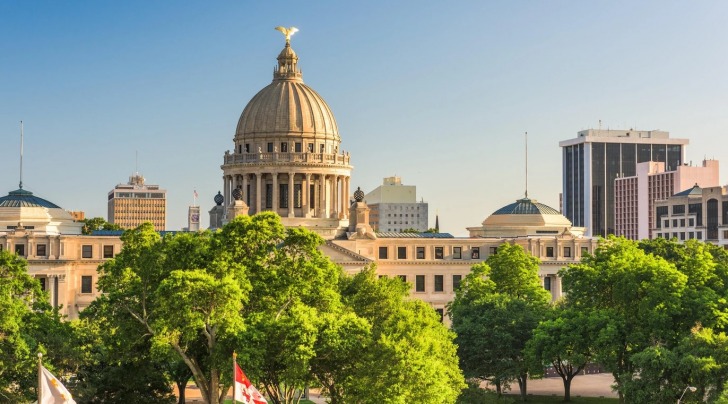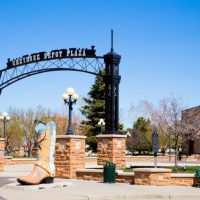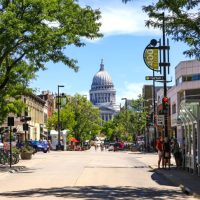Whether you were born, got stationed, or moved here, Mississippi has a lot to offer someone looking for a slower pace, low cost of living, beautiful scenery, and fun family festivities.
For example, the Gulf Coast hosts Cruisin’ the Coast: America’s Largest Block Party in October and Black Spring Break in April: a historical festival based on the first attempt to desegregate Mississippi’s beaches in 1959.

Contents
Pros of Living in Mississippi
1. Car Shows
Cruisin’ the Coast: America’s Largest Block Party, including classic cars and rat rods, a sock hop, and a classic car charity auction, has been a Mississippi staple for more than 25 years, and Scrapin’ the Coast: with its hot rods and trucks with extreme lift kits, has coal-rolled up and down I-90 for 20 years. Each show has its unique appeal.
2. Pink Dolphins
You might rub your eyes and look twice before you believe what you see across the water from McElroy’s Harbor House restaurant in Biloxi, Mississippi.
A whole pod of pink dolphins sometimes swim past the spot, often following the bass boats used by area anglers and delighting McElroy’s patrons.
3. Scenic Views
From magnolias — the state tree — and live oaks, also known as Quercus virginiana, to the piney woods all over the state, you can always find flowers, foliage, and forests to delight the senses.
Mississippi features six National Forests: De Soto, near Wiggins; Bienville, near the aptly-named town of Forest, Mississippi; Tombigbee, near Ackerman; Holly Springs, near Oxford; Delta, near Rolling Fork; and Homochitto, near Meadville.
4. Famous People
Morgan Freeman: Although born in Memphis, Tennessee, Morgan’s grandmother lived in Charleston, Mississippi.
The actor bought his grandmother’s 124-acre farm from his parents in 1991 and turned it into a honeybee sanctuary.
Brett Favre: Born in Gulfport and raised in Kiln, Favre attended the University of Southern Mississippi and became a starting quarterback as a freshman.
The NFL inducted Favre into the Pro Football Hall of Fame in 2016.
Oprah Winfrey: Hailing from Kosciusko, Mississippi, Oprah moved to Nashville, Tennessee, in her teens to live with her father.
Winfrey attained billionaire status in 2003, and Forbes Magazine listed her as the world’s only black billionaire for the next three years.
Her current net worth is $2.5 billion.
Fannye Cook: This Crystal Springs native pioneered Mississippi’s earliest conservation efforts and founded the Mississippi Department of Wildlife, Fisheries, and Parks.
Before her efforts, no one had bothered to catalog Mississippi’s wildlife.
Vera Mae Berry Pigee: Born near Glendora in Leflore County, Mississippi, Vera studied cosmetology before opening a salon in Clarksdale.
Her economic independence enabled her to pursue civil rights activism.
As the mother of Mississippi’s civil rights movement in the 1960s, Vera chartered the Coahoma County branch of the NAACP.
In addition, she organized citizenship schools to teach African Americans how to register to vote.
5. Fairs and Festivals
Located at 1207 Mississippi St, in Jackson, the Mississippi State Fairgrounds hosts the annual state fair in October under the auspices of the Mississippi Department of Agriculture and Commerce.
In addition, the Magnolia State boasts no fewer than 18 coliseums, including the Mississippi Coast Coliseum and Convention Center in Biloxi.
Mississippi Renaissance Festival
As one of the most inclusive festivals, translators and ASL interpreters stand ready to assist.
People with sensory input issues will find Safe Havens throughout the Faire, and all menus feature local, easily recognizable foods.
Additionally, the bounce house in the dedicated kid’s area and Faire t-shirts designed to replace scratchy garb allows anyone to represent their favorite Towne without triggering meltdowns or touch aversions.
6. Higher Education: HBCUs
Mississippi has 76 colleges and universities, including historically-black land grant university Alcorn State University: the Alma Mater of Mississippi-born Civil Rights Activist Medgar Evers.
In addition, Mississippi has five more historically-black colleges and universities: Jackson State University in the state capital, Rust College in Holly Springs, Tougaloo College, Mississippi Valley State University, and Coahoma Community College in Clarksdale.
7. Waterfalls
You can visit 15 waterfalls in Mississippi, including Seminary Falls on the Okatoma River.
The green-tinged Scutchalo Falls near Carlisle and Carpenter drop about four feet. Ferris Falls on the Eastabuchie River drops two to three feet.
Merit Falls lies within the 25-acre Merit Waterpark in Simpson County.
Tishomingo State Park has four waterfalls of varying heights.
Additionally, you will find Bear Creek Falls near Dennis, Rawson Gully Falls in Lauderdale County, Black Creek Canoe Falls, and Clark Creek Falls.
Brushy Creek Waterfall runs in Homochitto National Forest, while Union Falls lies in Jones County.
Find even more waterfalls to enjoy throughout the state: Owens Creek Falls near Vicksburg, Cooper Falls in J.P. Coleman State Park, artificial Dunn’s Falls, and Mint Spring Falls in Vicksburg National Military Park.
8. Wildlife
Least terns, brown pelicans, Sandhill cranes, and ospreys make their homes along Mississippi Gulf Coast and some inland waterways for at least part of the year.
As a result, all four endangered species receive protection in Mississippi, especially during nesting season.
Moreover, 426 species of birds, 84 different reptiles, and 120 species of fish call the Magnolia state home annually.
9. Snowfall
Skiers and Snowboarders would disagree, but Mississippi’s lack of annual snowfall makes the state a great place to retire if you have had enough shoveling out your driveway only to have a plow come by and shove everything back into place.
Mississippi’s regular annual snowfall total: one rapidly disappearing inch.
Cons of Living in Mississippi
1. Economic Indicators
Of Mississippi’s estimated 2,949,965 people, 15.4 percent lack health insurance, and 18.7 percent fall below the federal poverty line.
In addition, Mississippi’s statewide 4.1 percent unemployment rate stands half a percent higher than the national average.
Nevertheless, the statewide unemployment rate conceals enormous disparities.
For example, the 11.9 percent unemployment rate in Jefferson County, the 8.1 percent rate in Humphreys, and the 7.6 percent rates in Claiborne and Issaquena conceal the constricted pool of employment options.
2. Humidity
Mississippi’s average annual humidity of 91 percent makes the state the most humid in the entire country.
Locals refer to it as living in the Devil’s armpit, while newcomers describe the humidity as trying to breathe in a swimming pool with your nose partway underwater.
3. Hurricanes
Although locals treat these summer blowouts as party time, tourists and transplants find hurricanes terrifying.
A certain fatalism sends locals to the grocery store, where, surprisingly, no one takes everything for themselves.
Instead, you will see people handing each other bottled water, canned meat, and barbecue lighters as locals double up on Bud Light, White Claw, and hard seltzer.
Harbor Freight and Home Depot stay open until the last minute before going home to their families.
As a result, everyone’s tool sheds fill up with outdoor toys and garden furniture.
And unless the storm already exceeds Category One on the Saffir-Simpson scale before landfall, no one boards up any windows.
But do not let the apparent calm fool you.
Residents already have their hurricane closets and bugout bags filled.
They placed a fire ax in the attic crawl space and have their hurricane evacuation routes planned to the exact carrying capacity of whatever vehicle they drive, with plans B through Z memorized.
After charging every device they own and locating the battery-operated tea lights and LED lanterns, they ensure their solar chargers and hand-crank radios stay handy and generators get filled.
And remember, put a quarter on top of a chunk of ice in the freezer.
Then, if it is still on top or in the middle, you will not have to toss the contents of your fridge and freezer.
4. Plecia nearctica Hardy: Love Bugs
Bring a white vehicle to Mississippi in April, and expect your grille to look like a murder scene at the slaughterhouse.
Plecia nearctica Hardy, AKA love bugs, fill the air and cover every surface in spring, mating for five days.
These bugs have no stingers and do not bite, but they can ruin any outdoor event.
Expect them to wind up floating in your sweet tea at some point.
Do not expect your car to stay clean until May.
Car washes, however, think love bug season rocks.
5. Snakes
Only six of Mississippi’s 55 snake species have venom.
Of these, 75 percent of snake bites occur because people or animals insist on harassing or trying to kill them.
Sistrurus miliarus: AKA the Pygmy Rattlesnake, inhabits the entire state of Mississippi.
Most commonly, however, you may encounter one on the Gulf Coast in swamps or the piney woods and hardwood forests in the state’s northeastern corner.
Take care when moving a barrel or trash can, as they will hide underneath them.
These venomous snakes resemble a mottled, bluish mini rattlesnake.
6. Alligators
You will find them in every Mississippi county, but 25 percent of all the state’s alligators live in the Pascagoula River drainage corridor in Jackson County.
These opportunistic predators eat anything from pet dogs and cats to fish.
Moreover, they even eat each other when they can’t find a more leisurely, suitable meal.
7. Dasymutilla occidentalis: Velvet or Cow Killer Ants
If you spot a large, bright red or vibrant blue ant wandering alone on a bare patch of sandy Mississippi soil, take several steps back.
This giant furry insect is a wasp.
If you see one on the ground, it is female.
Males crawl onto flowers, especially at night.
This venomous insect has an excruciating bite that generally will not kill you, but you might wish it had.
8. Vibrio vulnificus
This bacterium lives in Gulf Coast waters and causes a severe infection leading to limb amputation, multi-system organ failure, and death.
The condition commonly results from swimming and wading without footwear, uncovered cuts, and other skin breaks.
In a milder form, eating raw or undercooked shellfish such as oysters causes diarrhea, vomiting, and dehydration.

Pros and Cons of Living in Mississippi – Summary Table
| Pros of Living in Mississippi | Cons of Living in Mississippi |
|---|---|
| 1. Car Shows | 1. Economic Indicators |
| 2. Pink Dolphins | 2. Humidity |
| 3. Scenic Views | 3. Hurricanes |
| 4. Famous People | 4. Plecia nearctica Hardy: Love Bugs |
| 5. Fairs and Festivals | 5. Snakes |
| 6. Higher Education: HBCUs | 6. Alligators |
| 7. Waterfalls | 7. Dasymutilla occidentalis: Velvet or Cow Killer Ants |
| 8. Wildlife | 8. Vibrio vulnificus |
| 9. Snowfall |
Mississippi Safety Overview
READ THE FULL REPORT: Mississippi Safety Review
Safety Index:
- OVERALL RISK: MEDIUM
- TRANSPORT & TAXIS RISK: LOW
- PICKPOCKETS RISK: LOW
- NATURAL DISASTERS RISK: MEDIUM
- MUGGING RISK: LOW
- TERRORISM RISK: LOW
- SCAMS RISK: LOW
- WOMEN TRAVELERS RISK: LOW
Frequently Asked Questions
What causes Vibrio vulnificus infections?
Eating raw or undercooked shellfish, swimming in the Gulf with uncovered cuts and breaks in the skin, or wading barefoot will cause Vibrio.
How humid does Mississippi get year-round?
Mississippi averages 91 percent humidity, making it the most humid U.S. state.
Does Mississippi have ospreys and Sandhill cranes?
Yes, the state protects these endangered birds, especially during nesting season.
In addition, brown pelicans and least terns also receive protection.
Which famous Mississippian turned his family farm into a bee preserve?
Morgan Freeman did.












Religion is pervasive and common sense is low in this state
Common sense is low everywhere but at least most southerners can live off the land unlike our more modern City Bred People whom many think that steaks come from a butcher shop and not from a cow , So lets don’t get started on Common sense.
If I wanted to move to Mississippi on disability where would be the best place to move with a family.